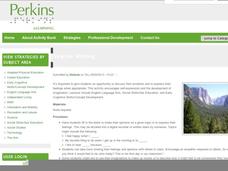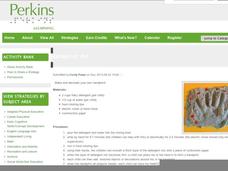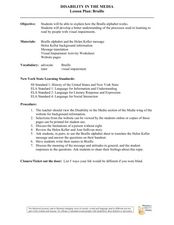Museum of Disability
Taking Visual Impairment to School
What is the world like when you can't see, or when your vision is impaired? Learn about how Lisa communicates with the world around her with Taking Visual Impairment to School by Rita Whitman Steingold. Learners answer...
Perkins School for the Blind
Encouraging Students Who are Blind or Visually Impaired to Express Their Feelings and Explore Imagination
Being expressive in a creative, empathetic, or imaginative way is not only fun, it builds good pre-writing and communication skills. Learners with visual impairments have a roundtable discussion session where several sentence frames...
Perkins School for the Blind
Handprint Art
Stimulate the senses with a handprint art project! Flake laundry detergent, water, and food coloring are mixed together to create a substance that has a pleasant smell and will dry hard and dimensional. Children with visual disabilities...
Film English
Theo’s Story
Encourage your class to consider a beautiful short film about a boy named Theo who happens to be visually impaired. Over the course of the instructional activity, pupils work in pairs, discuss their ideas and the film as a class,...
Curated OER
Disability in the Media Lesson Plan: Braille
Students determine the workings of the Braille alphabet and how people with visual impairments learn how to use it. In this Braille lesson, students study the associated vocabulary, read about Helen Keller, and complete associated...
Curated OER
Visual Impairment Based on a Children's Book
Students explore practical information about visual impairment. They explore about the uses of seeing eye cane. Students explore the postive aspects about how people fucntion in spite of handicaps. They explore about helping others.
Perkins School for the Blind
Grocery Shopping
Grab those reusable bags, it's time to go shopping! Intended to foster independent living skills in learners with visual impairments, the lesson covers several topics related to grocery shopping. They start by planning a meal, reading...
Perkins School for the Blind
Taking Turns
For small children or learners with disabilities, learning to wait patiently and taking turns is very important. In pairs, two children with visual impairments take turns asking for, waiting for, and playing with a musical...
Perkins School for the Blind
Baseball
Baseball is an American pastime, super fun to play, and can be made accessible to learners with visual impairments. Instead of taking to the ball field, your class can learn the rules of the game by playing a small three-dimensional...
Perkins School for the Blind
What Would You Do If...?
What would you do if...? That's a great question, and, when posed to learners with visual impairments, a question that can foster concept development and speaking and problem-solving skills that relate to real-life situations. The...
Curated OER
Rhythm and Art: Elements of Art
Students discover the three elements of art. In this visual arts lesson, students examine line, shape, and color of works by Torres-Garcia and Picasso. Students then identify the elements of art in works by other artists.
Perkins School for the Blind
Familiar Sounds
To foster concept development and auditory discrimination skills, learners with visual impairments listen to identify a variety of common sounds. The teacher makes recordings of various sounds, including those found in the home, at the...
Perkins School for the Blind
Learning to Identify Sounds Made by the Body
Sneeze, snap, tap, and whistle; Did I do that? Explore the parts and sounds of the human body with your learners with visual impairments. First you'll name the parts of the body, make a sound with each part, and then have the class...
Perkins School for the Blind
Left Versus Right
When you can't see, it is extremely important to be able to reorient yourself. Learners with visual impairments work though an activity to build spacial awareness based on moving left and right. A marker (bracelet, bell, or weight) is...
Perkins School for the Blind
Put the Shoe on Your Foot
Promote clothing identification, body part identification, and dressing skills acquisition with a fun and lively game. Each child takes turns grabbing a clothing item from the central clothing box. As he puts the item on, he sings,...
Perkins School for the Blind
Treasure Hunt
On, over, and under are some very common prepositions; but how can you teach these concepts to children with visual impairments? Here, is one way. Kids will practice following verbal commands as they go on a classroom treasure hunt. They...
Curated OER
Vocabulary/Reading Lesson for Students with Severe Intellectual Disabilities
Here is a great little reading and vocabulary development lesson plan created just for learners with special needs. The lesson plan is constructed with both core content and necessary adaptations in mind. The group will use PECS,...
Museum of Disability
Buddy, The First Seeing Eye Dog
Learn about how the seeing eye dog program began with a reading instructional activity about Eva Moore's chapter book, Buddy, The First Seeing Eye Dog. With vocabulary words, discussion questions, and extension resources, the...
Curated OER
Rhythm and Art: Gesture Drawing
Students make connection between music and art. In this integrated arts instructional activity, students complete gesture drawing activities as they listen to Cuban, flamenco, classical, jazz, and contemporary music.
Nazareth College
Chronological Order
First, next, and last, the elements of chronological order. In every story or text one can find a series of events that occur one after the other. To help learners with visual impairments conceptualize chronological order, this...
Perkins School for the Blind
Tactile quilts that tell a story
Learners with multiple disabilities need to engage in projects that push them to know their full potential. They need to be able to express themselves in a variety of ways, and this very thoughtful lesson does just that. They make a...
Museum of Disability
A Picture Book of Louis Braille
Teach kids about the beginnings of the Braille writing system with a lesson about Louis Braille. A series of discussion questions guide young readers though A Picture Book of Louis Braille by David A. Adler, and once they finish the...
Perkins School for the Blind
Let's Pretend
Playing pretend with real objects or concepts is a wonderful way for learners to make object-to-action connections, as well as practice daily living skills. Learners with visual and intellectual disabilities use a wide variety of real...
Perkins School for the Blind
Hat Game
Sometimes the simplest ideas foster a lot of different skills. To boost social skills, group participation, identifying others by name, and dressing skills, learners play the hat game. They take turns wearing a hat while...























